Interview with Masahiko Otsuka, president of TRIGGER, who takes the reins of the rampage horse staff who are 'one work completely burned' about the back side of 'Promare' production and management

Trigger, Inc. | ANIMATION STUDIO TRIGGER Inc.
http://www.st-trigger.co.jp/
Movie 'Promare' Official Website 5/24 (Friday) National Road Show
https://promare-movie.com/

GIGAZINE (hereinafter, G):
Four months after the
President Masahiko Otsuka (hereinafter referred to as Otsuka):
It feels beyond my imagination. Of course, as a dream, the staff talked about cheering screenings and wishing that 4D screenings would be decided, but it was just a dream. I'm glad that the 'Like' has come to be realized.
In addition to the 'flame' screening of 'Promare' on June 20, 2019, it has been decided that a 4D screening will be held from October 18, 2019 (Friday).
▲ The ban on '4D' posters drawn by director Hiroyuki Imaishi has been lifted ??
— The movie 'Promare' is showing a big hit! (@promare_movie) October 9, 2019
Shake ?? Get wet ?? Shine?
A poster drawn by Director Imaishi has been completed for the 4D screening from 10/18 ?? In addition, a 'visual card' using this visual will be presented to the visitors ?? Everyone, we are waiting for you ??
For more information ?? https://t.co/wMPeqrGbXI #Promea #PROMARE pic.twitter.com/olXtRAfUlz
G:
Did you exceed the goal of 'I want you to go this far'?
Otsuka:
When making 'Promea', there was a point that I could not understand until I opened the lid.
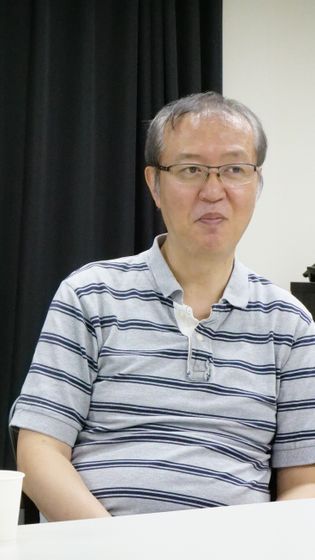
G:
He said, 'I don't know until I put it out, but let's try it!'
Otsuka:
Since it is an original work and does not have a well-known original, it could have been a catastrophic defeat. Of course, there are fans who are chasing TRIGGER and Imaishi's work, so I thought that it was not completely zero. However, it is really unknown how much you can see when you make a new one. Especially these days, there are many parts that cannot be measured by calculation as to what makes the work bounce.
G:
Did you mean that you were in the best direction while you were prepared for the worst case as a manager?
Otsuka:
I agree. After the work is completed and released, no matter how hard we try, it will not be possible, so the idea was to entrust it to the customers who receive this work when it is released.
G:
It may seem like a work that is in line with the times, but it's more like a work that has been managed rather than a plan to extend it further.
Otsuka:
Of course, I want to do my best to reach the point where I can stretch it. But, from my point of view, it's not stable at all (laughs). Once we start making works, we can't stop. Every time I say, 'Make it sloppy,' I join the staff and devote myself to making the work. I'm sure I'm happy to be a hit, but I've put a lot of effort into it, so there are places like 'If you don't hit, it's over.' So, with the success of 'Promea', it feels like 'I can bet again!'.
G:
Do you feel like you're competing in the dark when you put out a work?
Otsuka:
In the long run, the staff is growing steadily, although it is slower than when TRIGGER was first established, but there are some challenges that do not match the growth process.
G:
At first, he thought that he would leave the work to the staff and concentrate on management.
Otsuka:
I agree. When I started the company, I wanted to be able to do it even if I wasn't at the site, but it seems that I have returned to the site after all, so I was able to achieve my first goal. There is something that isn't there.
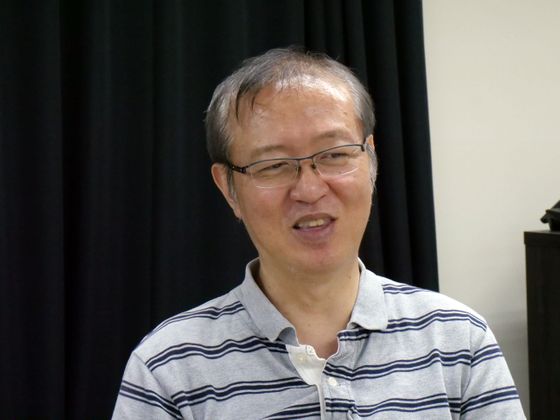
When I had to do it, I thought it was really an emergency for the company, but in the end it was all over, so I said, 'It's always an emergency!' (Everyone laughs). It doesn't become fashionable. I'm laughing (looking at the staff who were there)
G:
Do you mean that the on-site staff will inevitably call you?
Otsuka:
Since the production people who are in the position of controlling the site are all those who entered the animation industry after establishing the company, they have little absolute experience, and for those who have a lot of experience in the field, they are juniors. It seems difficult to tell seniors because you will be in a position. Only old staff and myself can say that.
G:
Human resources who can hold the reins are not so easy to grow.
Otsuka:
After all, everyone respects our director and animator who belongs to TRIGGER, so when someone like that wants to do it, the desire to do it seems to win. You can also see that it is difficult to say 'No'. If you don't have to say it, you don't want to say it. Still, there aren't many people who can say 'bad things are bad' with their hearts as demons.
G:
I can imagine that animators will not grow up overnight, but it is difficult to train people involved in production.
Otsuka:
I agree. The background is that we do not make production-led animation, and if we do not know the site, we can not distinguish between places where we should focus and places where we should not, and we can not say that it is persuasive. .. It is possible to do it if it is a production with a high experience value, but that is the difficult part of the work of production.
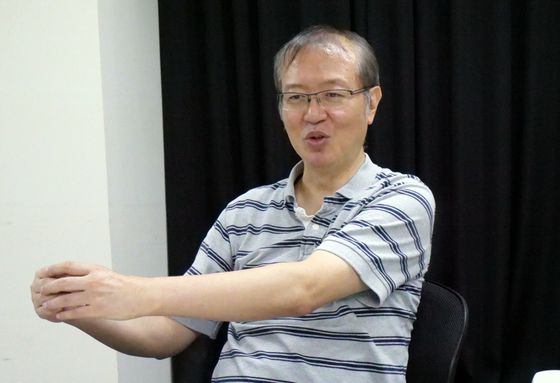
Therefore, I also have to work together to learn 'Is it okay to do it this way?', So I end up making anime myself. If you just keep the schedule mechanically, it's not easy, if not impossible. However, it is very difficult to make what everyone wants and keep the schedule. The reality is that it is even more difficult to achieve this with only people who have less experience than in the field.
G:
Did the production people grow through 'Promea'?
Otsuka:
Every time I make one work, I can gain more experience, so I feel that I am growing up. On the other hand, there is no goal to grow up to this point, and the things that we want to do in the field will continue to increase forever, so the issue of how to deal with it always comes up. Therefore, the site and production will continue to grow together. There are things like 'If you stop, you will die.' That's an interesting part, but at the same time, I sometimes wonder how much I should do. If you put it into routine work, it will be more efficient, but then there will be no new challenges. In that sense, I feel that there is no correct answer.
G:
I would like to ask Mr. Otsuka, who is also the owner, about some money. Although it is another company, the color that is working on the 'Evangelion New Theatrical Version' series has the title 'Eva', so I will make a work with the lowest recoop (profitable) line, and if I get box office revenue, I will make the next work Director Hideaki Anno said in an interview with Diamond Online that he is operating without debt in the form of making the expenses a little abundant.
On the other hand, I hear that some companies collect a large amount of money and use it for production costs, saying, 'I'll hit it with this director!' How does TRIGGER go through this cycle?
Otsuka:
Basically, we have a production fee in advance. For example, in the manufacturing industry, it is common to purchase parts by borrowing and deliver the products and return the money, but in the animation industry, the orderer pays in advance before delivering the work. The shape is common. Sometimes I borrow money from a bank, but it's a way to get the production costs in advance.
It's easy to think that the studio that makes anime often has a lot of decision-making power, but in the sense that we receive orders and receive production costs, we are just a subcontractor. Certainly, in the case of an original work, it has the rights as the original author, but it is the same in that it is a subcontractor who makes animation. We sometimes make anime in response to an order to 'make this kind of work', so the animation as a work is not only for us, but also for investors such as production committees.
It's not surprisingly known, so if something happens, the studio will be struck by the brunt (laughs). Sometimes I think, 'No, I didn't decide,' but it's hard to understand.
G:
In the case of TRIGGER, it is a name that is recognized at least among anime fans, so it may be easy to raise the name.
Otsuka:
Of course, I have a desire to brand the studio, so I also want to bring the name to the fore. On the other hand, we don't pay for the production ourselves, so it's a little mysterious situation that 'it's a work we made, but it's not our own.'
G:
Is it difficult to raise production costs in-house unless you are a very large company?
Otsuka:
Yes. It is basically difficult to do it by yourself because a company that is not big in terms of scale has to collect hundreds of millions of yen.
G:
I still have a question about production costs. For example,
Otsuka:
I am proud that 'Promare' has received considerable favorable treatment considering the number of years since TRIGGER was established and its achievements, and thanks to that, 'there is no money on site'. There is none.
However, it is a headache for the manager, but it is used up and exhausted. Since I made it with great effort, it should be easy if I could make a sequel or a work that inherited the settings, but our staff said, 'I will not leave any regrets! One work is completely burned !!' (laughs) ) So, when it's over, 'I've done it ... OK, let's start something else next time', which is my dream as a creator (laughs).
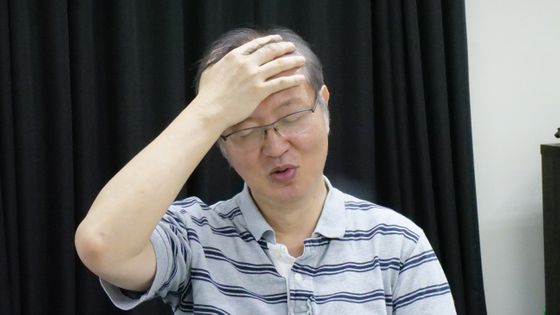
Otsuka:
The company must survive, so it cannot collapse. However, I didn't start a company because I wanted to make money, but I set up a studio to do what I wanted to do, so I said, 'Let's keep costs down a little more,' but in the end, 'Yeah, it can't be helped ... …. To the extent that it doesn't collapse ”(laughs)
G:
In that sense, does it mean that 'Promea' achieved the best results that Mr. Otsuka suffered?
Otsuka:
that's right. Of course, I'm sorry for those who paid the production cost rather than not selling it, and if I can get the result, it will lead to the next work, so the hit of 'Promare' is business-wise. I'm happy.
G:
You mentioned earlier that you didn't start a company because you wanted to do business, but does TRIGGER's policy be to 'create interesting works while surviving'?
Otsuka:
That's something that our generation has come up with, so that's something we can't miss. On the other hand, although it is an organization called a company, there are not only people who work only for animation, but also staff with various values, so 'While establishing it as a business, let people who want to do it do everything. I feel that it is necessary to draw a line.
Therefore, it cannot be ignored what kind of fund allocation is appropriate. Since the animation industry itself is not in a good condition, there is a part that is financially difficult. On top of that, it's hard to say that the staff should be overwhelmed. In particular, if you allow a position like me to be devoted to making anime, it can lead to 'rewarding exploitation.' Of course, there are people who value 'rewarding', but I always keep in mind that there are people who have different ideas.
Speaking of various ideas, although TRIGGER itself is closer to the site, the management side and the site side may even have 180 degree differences in thinking, so I have to balance the two ideas within myself. I feel like I'm splitting up, so I think it would be easier if I could concentrate on one of them, but that's not allowed, which is the hard part of my current position.
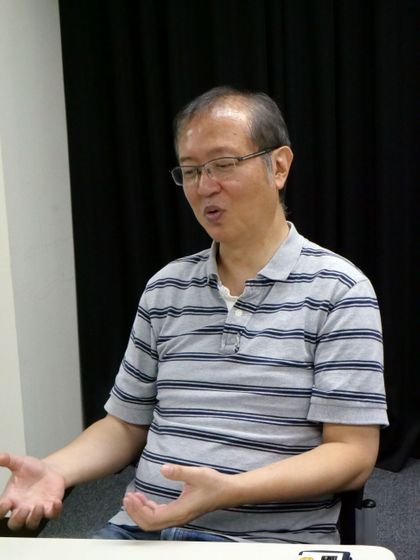
Otsuka:
Sometimes I have to say the exact opposite of the case, so I later wondered, 'I said that, but is that what you really mean?' And I'm saying that. 'Sometimes I feel humorous.
G:
Maybe the staff also know that 'it's an opinion because I'm doing both on-site and management'?
Otsuka:
I think it is. That's why it's also a little today. If you are told from either side, you can repel, but if you know both, you can't say anything. Everyone is accepting me, even though they look reluctant.
G:
Is Mr. Otsuka's goal to eventually concentrate on management?
Otsuka:
I'm not good at management, but even if I leave the business to someone, I can't leave it to others to decide what kind of policy to proceed, so I have to balance management and the field. thinking about.
G:
【notice】
— TRIGGER Inc. (@trigger_inc) September 30, 2019
Movie 'Promare' Memorial Book 'Paper, no better. We have closed the deadline for build-to-order manufacturing, but we received a large number of inquiries about reorders, and we have decided to receive a second order from 12:00 AM on October 1st (Tuesday) tomorrow. The order period is one week until Tuesday, 8th ?? Click here for details ?? https://t.co/cFx0ILyyy9 #Promea pic.twitter.com/dbhNbzdN5k
Otsuka:
It is very difficult to make a profit from anime works alone, so making goods is one of the profits. Of course, if you make an animation within your budget, you can do it only by making an animation, but if you want to make an animation only by selling the work, you will have to keep the production cost considerably low. Therefore, the profits obtained from media mixing and selling goods are used to cover the production costs.
Since it is not possible to rely solely on production costs, by actively making profits by utilizing animation as an advertising tower, such as goods, mail-order products, and events that the companies involved in the production committee do not sell. I try to secure the rewards to be given to the staff. I think the current anime industry will be tough if we don't make more profits by using anime works and find things that other companies can't do, as far as the studio allows.
G:
A memorial book that includes comments from creators in the company is also one of them.
Otsuka:
I think that the memorial book is a work that can be made only at the production site. However, just because the memorial book has been well received does not mean that it is possible to make an anime with just the profits, so we are always looking for ways to make money.
G:
By the way, what is TRIGGER's position in terms of scale from the perspective of the anime industry as a whole?
Otsuka:
Is it normal? It's not that big, but it's smaller than ours. For example, even if you try to make one cool anime now, TRIGGER alone cannot do all the drawing. Therefore, I would like to be able to do drawing in-house at least. Currently, there is only one production line, and we often refuse orders, so I would like to increase the number of staff. However, it is not possible to increase the number of staff at one time, and some people can quit, so we will gradually increase the scale while repeating slight increases.
G:
Is it one goal to complete the drawing in-house?
Otsuka:
I agree. In other words, having a department in the company where you can take pictures will help you communicate faster, and it may be difficult at the last minute. However, considering the scale of drawing, it is not yet large enough to supply work at all times, and it is difficult to reach that level at this point.
Even if it repeats a slight increase, the scale of 10 or 20 years from now is known, and I think it will be difficult to become a company that is moving several lines, but 'I wonder if 10 years from now is about this scale.' I manage while thinking about that.
G:
You can't increase 10 or 20 people at once.
Otsuka:
If we were to increase it, we would have to fundamentally rethink how to make anime. From a management point of view, I feel that there is a big change in the sales channel of anime, which is shifting from selling software such as DVDs and Blu-rays to distribution. On the other hand, the biggest change in the field of animation making is that drawing is shifting from analog to digital. Of course, there are times when analog drawing is more free, and there are times when digital is more advantageous.
Given these differences, it will be necessary to reform the workflow for digital rather than moving the analog workflow to digital as it is. At that timing, I would like to change the way human resources are used and find out how to make anime in the future.
G:
When I saw the rush check of 'Promare', I was surprised that Director Imaishi had made a quick correction with a pen and it was so fast even digitally.
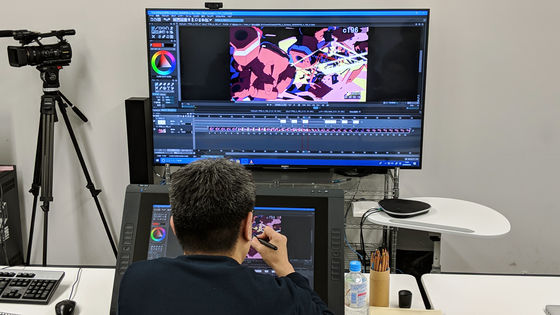
Otsuka:
It's in the middle of trial and error. For those who have been in analog for over 10 years, I think analog is still easier to do. We plan to have people who come in from now on acquire digital technology, but it still takes time for people who have gained experience in analog to become familiar with digital technology. This is probably the same perception in every studio.
G:
Indeed, the entire industry is in trial and error, isn't it?
Otsuka:
I don't think any production company has found the correct answer yet. It depends on what you think is the correct answer, but at least it's not yet digitally optimized. If some studios find the right answer, it's still unclear if the industry will do the same 'follow the right' or continue the traditional way.
Of course, there are also personnel exchanges, so there is a general common style, but if you do that, you will not be able to take full advantage of digital. Therefore, as the transition to digital progresses, I think that the uniqueness of each studio will naturally become more prominent.
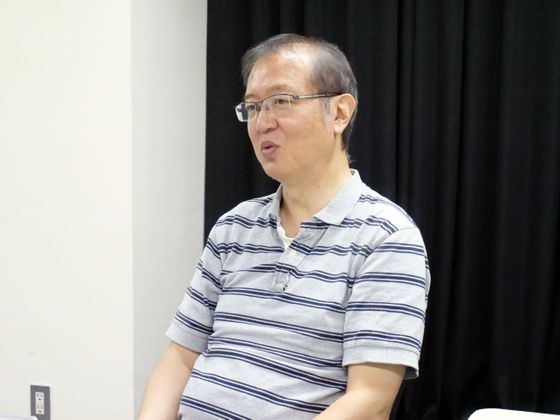
G:
Digital technology is also used abundantly in 'Promea', but even if it looks like that, is there any part that says 'It's actually quite analog'?
Otsuka:
As a result, the ratio of analog and digital is about half. Some of the drawings were done in analog and some were done digitally. However, there are still many things to do with analog methods now, and there are only a few parts that are unique to digital. Originally, it should be more efficient to make a cut that mixes analog and digital from the beginning, but that is not the case. Right now, the only difference is whether each animator does it in analog or digital, but little by little we are moving toward using analog and digital depending on the content of the work.
G:
Hand-painted technology cannot be replaced with digital as it is.
Otsuka:
There is that, and experience can even get in the way. In that sense, I have high expectations for new people. The transformation of the method that can be called invention will be born from new people.
G:
In an interview with director Hideaki Anno on Diamond Online, which I mentioned earlier, director Anno emphasizes the point that he emphasizes in management, 'I am conscious of' doing business as lucrative as possible. ' In other words, don't make it in the red. ' What kind of consciousness do you have as Mr. Otsuka?
Otsuka:
One of my goals is not to destroy the company. However, this does not mean maintaining the status quo. If you just maintain the status quo, you will become more and more depressed, so in order to maintain the company, you need to continue to grow and change.
In the first place, anime is not suitable for making money at all. Frankly, if you want to make money, you shouldn't do anime. Still, I chose to make anime because I wanted to make what I wanted to make. On the other hand, as long as we are a company, we cannot say so, so we must take the time to grow the company. In that case, it is a prerequisite that the company will continue to exist.
For example, just because a work is a big hit doesn't mean that the next day it will grow as if the company was reborn. Whether or not a work hits is like a bet, so you can't just rely on hits. Therefore, it is my job to grow the company and animation making little by little while looking 10 years into the future, and to keep the company alive until the next person touches the baton.
G:
Even if Mr. Otsuka retires from the president, it is not equal to lose the company.
Otsuka:
If the person who wants to make a work with this person stops making a work, I think that it is okay to retire cleanly saying 'I've done it so far, it's okay' and that's it. But that's not the case for company owners. It is the responsibility of the next person to be entrusted with the company. This is what I mean by 'keeping the company alive.'
G:
Specifically, what do you think is the way to keep the company alive?
Otsuka:
The surest thing is to make an anime within the production cost. If you manage with the money you have secured, the company will surely not collapse. And this is almost synonymous with 'keeping the schedule'. This is because the cost breakdown is mostly labor costs, so if the schedule is extended and the period of staff restraint is extended, the cost will increase accordingly. Factors such as the number of cuts also affect the cost, but since the number of cuts is decided from the beginning as well as the schedule, the cause of the cost overrun is still limited to the overrun of the schedule.
G:
Is it an image that if you can manage the schedule properly, it will naturally fall into the proper balance?
Otsuka:
that's right. If you make a good schedule first and make a perfect budget allocation, all you have to do is keep it. just……
G:
It doesn't always go according to schedule.
(Everyone laughs)
Otsuka:
If you make an original work, royalties may come in later, so there is an advantage that you can cover a certain amount of budget overrun by yourself. The truth is, I would like to use the royalties that come in later as pure profits for capital investment and staff salaries, but every time everyone spends their budget.
It would be nice if it fits within the production cost, but after about that, 'I can't raise it even if I want to raise everyone's guarantee.' 'Rather than that, we want to make what we want. I'll make it. ' It doesn't matter if all the people are happy with that, but as I said earlier, not all of them are.
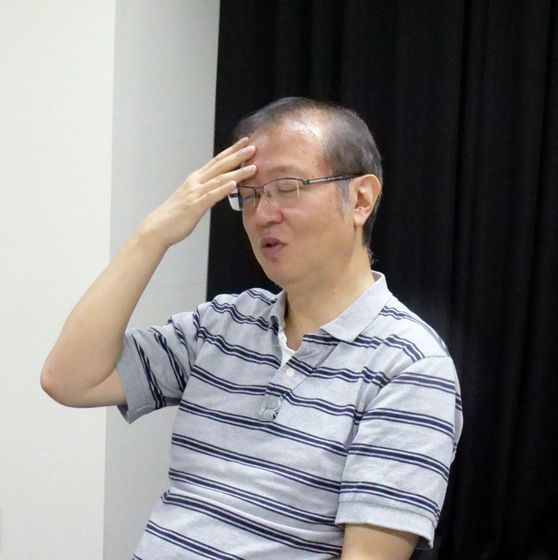
G:
In 'Promare', Mr. Otsuka finally took charge of about four positions including the deputy director and supported the work.
Otsuka:
I wonder what would have happened if I hadn't been in the field.
(Everyone laughs)
I think I've managed to make it public, but I think there are more parts that I couldn't finish. However, I don't know how much I was saved by joining myself. Even so, I feel that there was still a lot of potential for the work and what Imaishi wanted to do. So, Imaishi doesn't think he's done it. However, there wasn't enough manpower to do what Imaishi wanted to do. I think I could have done more if I had more, whether it was manpower or money.
On the other hand, it is clearly overkill. Even in its current form, it's already overkill from the original plan. So, although I have some leftovers, I don't think it was rude to the customer.
G:
As a fan, I was entertained more than enough, and since I was shown such a work, I would like to return something, or if there is something that can help, I would like to support it. If fans support TRIGGER, what is the best form?
Otsuka:
I think we are still receiving sufficient support. 'I watched it 10 times!' Is unlikely in a normal movie. It's the best way to support the audience. The rest is how wide this is. It's a work that doesn't seem to be suitable for everyone (laughs). But fans are not only in Japan but all over the world. The people who watch anime may be some people in any country, but since the world has more denominators than Japan, the total number of people who can watch anime is swelling. increase. It's encouraging from the standpoint of making niche works like us.
Mr. Yoshiyuki Kaneko, who directed 'Promea', said in French that he had seen it nine times in the theater.
9 fois au cinema
— Yasox SINGE PROFESSIONNEL ?? (@yasoxSH) August 21, 2019
Otsuka:
Speaking of greed, is there a shortage of staff? The current situation is that the animation industry as a whole is understaffed. No matter how much support you receive, nothing will happen without staff.
G:
So, is it the best to have people say, 'Then I will draw anime with TRIGGER'?
Otsuka:
Yes. If such people come in more and more, the schedule will not be exceeded due to labor shortage, and as a result, the cost will be reduced. Nowadays, the more people who can draw, the heavier the burden. I originally entered the anime industry after gaining experience in live-action, but the first thing I felt was that 'the higher you go, the harder it gets.' In the live-action industry, authorized people don't have to move that much, but in the anime industry, the more skilled people are in higher positions, so the higher they are, the more they work. There is nothing that will make you easier when you become great. This creates a kind of hellish composition, where the more you stand up, the more work you do.
G:
That is the part that is different from other jobs.
Otsuka:
Moreover, even though each work depends on individual skills, it cannot be done without cooperation with many people. Making animation is 'the ultimate individual work and the ultimate group work'. It's a really great culture, isn't it? That's why I think making anime is interesting. You can never make the same thing again, and the way you make the work changes steadily, so you never get tired of it. And since there is no goal, I have no choice but to keep running. At the same time as it is painful, it is also an interesting part of making anime.
G:
Are there any skills that you should acquire or that you should do in order to play an active role in TRIGGER?
Otsuka:
You can do anything. That is the goodness of digital.
In fact, the 'The Case of Hana and Alice ' made by director Shunji Iwai in 2015 was very interesting as a movie, whether or not it was liked by people who like ordinary drawing. Director Iwai is not a person in the anime field, but I think it was a work that was made because of that. Even if animation pictures, CG, rotoscope, etc. are mixed, the characters drawn in each expression look like the same character because the production is solid.
Conversely, if you can express consistently, you can use various tools, so now you have various options for making animation. So you don't have to give up making anime just because you can't draw. I am able to participate in the creation of works in various ways, and I think that such potential will continue to increase. I myself am in the animation industry even though I can't draw, so there must be a way to participate in animation making.
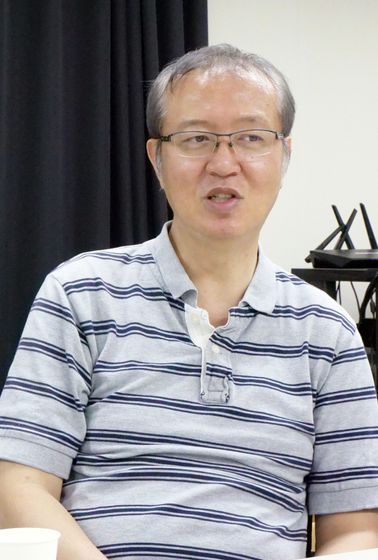
Otsuka:
For example, there are various ways to contribute, such as how to add music, how to edit
In particular, we do not have divisions for each department, and we have a stance of 'do it if you can.' If there is a 'Please let me do this kind of thing' and there is a chance of winning, I think I can do it enough. I wish I could do something.
However, if you want to make money, you should stop.
(Everyone laughs)
G:
I want you to know that as a premise.
Otsuka:
Yes.
G:
From the fans' point of view, I think it's saved that it's okay if you can't draw. Finally, as the president of TRIGGER, please tell us what kind of company you would like to make 'TRIGGER Co., Ltd.' in the future.
Otsuka:
I don't think it will change. I have a dream, but I have no specific goal, because I want to continue the company while expanding the circle little by little. However, I think 'I wish I could afford to make a work without trying hard enough to die'.
G:
It's not as vague as a dream, so you can call it a goal ...
Otsuka:
It's like a dream (laughs)
G:
I see (laughs). Thank you very much.
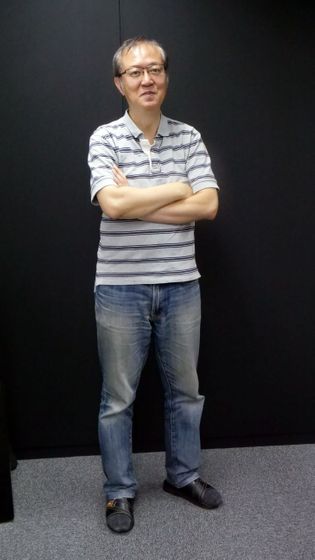
The long-running hit original animation 'Promare', which has exceeded the box office revenue of 1.2 billion yen, will be screened in 4D at 76 halls nationwide from today, October 18, 2019 (Friday).
You can check the details about 4D screening on the official website. Those who rush to the 4D screening will be presented with a visual card designed by Director Imaishi, so those who have already seen 'Promare' at the theater and those who have not already seen it will definitely go to the 4D screening. Please carry it and experience the hot world of 'Promare' with all five senses.
▲ The ban on '4D' posters drawn by director Hiroyuki Imaishi has been lifted ??
— The movie 'Promare' is showing a big hit! (@promare_movie) October 9, 2019
Shake ?? Get wet ?? Shine?
A poster drawn by Director Imaishi has been completed for the 4D screening from 10/18 ?? In addition, a 'visual card' using this visual will be presented to the visitors ?? Everyone, we are waiting for you ??
For more information ?? https://t.co/wMPeqrGbXI #Promea #PROMARE pic.twitter.com/olXtRAfUlz
Related Posts:
in Interview, Posted by log1l_ks







